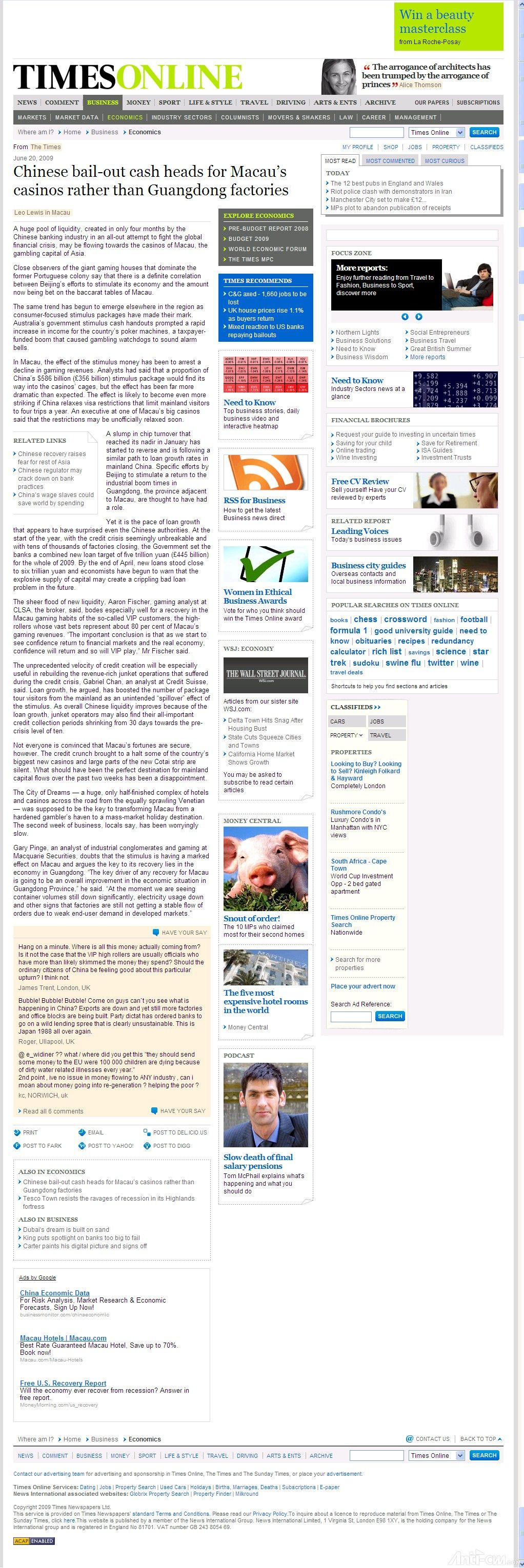|
|
本帖最后由 I'm_zhcn 于 2009-6-21 05:16 编辑
Chinese bail-out cash heads for Macau’s casinos rather than Guangdong factories
http://business.timesonline.co.uk/tol/business/economics/article6538574.ece
June 20, 2009 Leo Lewis in Macau
A huge pool of liquidity, created in only four months by the Chinese banking industry in an all-out attempt to fight the global financial crisis, may be flowing towards the casinos of Macau, the gambling capital of Asia.
Close observers of the giant gaming houses that dominate the former Portuguese colony say that there is a definite correlation between Beijing’s efforts to stimulate its economy and the amount now being bet on the baccarat tables of Macau.
The same trend has begun to emerge elsewhere in the region as consumer-focused stimulus packages have made their mark. Australia’s government stimulus cash handouts prompted a rapid increase in income for the country’s poker machines, a taxpayer-funded boom that caused gambling watchdogs to sound alarm bells.
In Macau, the effect of the stimulus money has been to arrest a decline in gaming revenues. Analysts had said that a proportion of China’s $586 billion (£356 billion) stimulus package would find its way into the casinos’ cages, but the effect has been far more dramatic than expected. The effect is likely to become even more striking if China relaxes visa restrictions that limit mainland visitors to four trips a year. An executive at one of Macau’s big casinos said that the restrictions may be unofficially relaxed soon.
A slump in chip turnover that reached its nadir in January has started to reverse and is following a similar path to loan growth rates in mainland China. Specific efforts by Beijing to stimulate a return to the industrial boom times in Guangdong, the province adjacent to Macau, are thought to have had a role.
Yet it is the pace of loan growth that appears to have surprised even the Chinese authorities. At the start of the year, with the credit crisis seemingly unbreakable and with tens of thousands of factories closing, the Government set the banks a combined new loan target of five trillion yuan (£445 billion) for the whole of 2009. By the end of April, new loans stood close to six trillian yuan and economists have begun to warn that the explosive supply of capital may create a crippling bad loan problem in the future.
The sheer flood of new liquidity, Aaron Fischer, gaming analyst at CLSA, the broker, said, bodes especially well for a recovery in the Macau gaming habits of the so-called VIP customers, the high-rollers whose vast bets represent about 80 per cent of Macau’s gaming revenues. “The important conclusion is that as we start to see confidence return to financial markets and the real economy, confidence will return and so will VIP play,” Mr Fischer said.
The unprecedented velocity of credit creation will be especially useful in rebuilding the revenue-rich junket operations that suffered during the credit crisis, Gabriel Chan, an analyst at Credit Suisse, said. Loan growth, he argued, has boosted the number of package tour visitors from the mainland as an unintended “spillover” effect of the stimulus. As overall Chinese liquidity improves because of the loan growth, junket operators may also find their all-important credit collection periods shrinking from 30 days towards the pre-crisis level of ten.
Not everyone is convinced that Macau’s fortunes are secure, however. The credit crunch brought to a halt some of the country’s biggest new casinos and large parts of the new Cotai strip are silent. What should have been the perfect destination for mainland capital flows over the past two weeks has been a disappointment.
The City of Dreams — a huge, only half-finished complex of hotels and casinos across the road from the equally sprawling Venetian — was supposed to be the key to transforming Macau from a hardened gambler’s haven to a mass-market holiday destination. The second week of business, locals say, has been worryingly slow.
Gary Pinge, an analyst of industrial conglomerates and gaming at Macquarie Securities, doubts that the stimulus is having a marked effect on Macau and argues the key to its recovery lies in the economy in Guangdong. “The key driver of any recovery for Macau is going to be an overall improvement in the economic situation in Guangdong Province,” he said. “At the moment we are seeing container volumes still down significantly, electricity usage down and other signs that factories are still not getting a stable flow of orders due to weak end-user demand in developed markets.”

|
cash, casinos, Chinese, heads, Macau, cash, casinos, Chinese, heads, Macau, cash, casinos, Chinese, heads, Macau
|